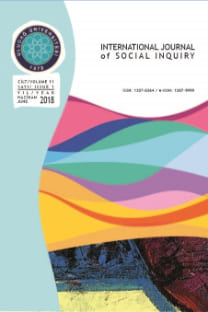In the Name of Modernity: Smoking Away Health, Wealth, and Womanhood in Gecekondu
In the Name of Modernity: Smoking Away Health, Wealth, and Womanhood in Gecekondu
We explore factors that affect smoking behavior and perception of women who have lived in gecekondu ("built-over-night") neighborhoods. We conducted semi- structured in-depth interviews with a convenience sample offifty (50) women who were married, smoked, lived in gecekondu neighborhoods in Yukseltepe near Ankara, from 2007 to 2008. Women were ages 20 to 60 years and had lived in gecekondu for at least 15 years. Data were analyzed using content analysis techniques and open coding followed by axial coding. Multiple themes emerged that were coded and classified. We highlight four classes of "smoking as an affective response," "social ties as safeguard," "social isolation as risk," and "media influence" themes and discuss their influence on gecekondu women's smoking behavior. We conclude that effective health promotion programs to address smoking among these women must be rooted in socio-ecological principles have dimensions that go well beyond individual-based behavior change interventions.
Keywords:
Smoking and Turkish women, gecekondu, modernization ecological principals, health promotion.,
___
- Bilir, N. & Onder, Z. (2000, May). Impact of the ban on smoking in public places in Turkey. In A. Javor & W. von Eimeren (Editors), Seventh International Conference on System Science in Health Care, Budapest, Hungary.
- Cassel, J.C. (1976). The contribution of the social environment to host resistance. American Journal of Epidemiology, 104, 107-123.
- Çakır, S. (2007). Kentlesme ve gecekondu sorunu: Elazig örnegi, [Trans.: Urbanization and Gecekondu Problem]. İsparta: Fakülte Kitabevi.
- Dagli, E. (1999). Are low-income countries targets of the tobacco industry? International Journal of Tuberculosis and Lung Disease, 3(2), 113-118.
- Dedeoglu, N. (1994). Tobacco use among health personnel (physicians and nurses) in Antalya. Turkish Journal of Smoking and Health, 1 ,7-11.
- Ergin, I., Hassoy, H., Tanık, F.A., Aslan, G. (2010). Maternal age, education level and migration: Socioeconomic determinants for smoking during pregnancy in a field study from Turkey BMC Public Health,10:, 325-333.
- Fırat, D. (1996). Tobacco and cancer in Turkey. Journal of Environmental Pathology, Toxicology and Oncology. 15(2-4):155-160.
- Kılınc, O. (2012). Türkiye Sigara İçimi ve Tedavisi İçin Yıllık 50 Milyar Dolar Para Harcıyor, http://www.haberler.com/turkiye-sigara-icimi-ve-tedavisi-icin-yillik-50-3536989-haberi/Accessed on April , 2012.
- Mackay, J., Eriksen, M., Shafey, O. (2006). The Tobacco Atlas. American Cancer Society, 2 ed. Atlanta, GA.
- Mittelmark, M.B. (1999). Social ties and health promotion: suggestions for population-based research. Health Education Research, 14 (4): 447-451.
- Official Gazette (2006). National Tobacco Control Program Directive, Online at: http://www.ttb.org.tr/mevzuat/index.php?option=com_content&view=article&id=441:ulusalt-kontrol- programi-hakkinda-baakanlik-genelges&catid=3:tebligenelge&Itemid=35, October 9, 2006.
- Payne, B.K., McClernon F.J., & Dobbins, I.G. (2007). Automatic Affective Responses to Smoking Cues. Experimental and Clinical Psychopharmacology, 15(4):400 - 409.
- Shafey, O., Dolwick, S., & Guindon, G.E. (2003). Tobacco Control Country Profiles 2003. Atlanta:American Cancer Society.
- TUİK Turkish Statistical Institute (2008). Küresel Yetişkin tütün Araştırması [Global Adult Tobacco Survey]. Online at: http://www.havanikoru.org.tr/Docs Tutun Dumaninin Zararlari/KYTA Kitap Tr.pdf, December 29, 2010.
- Wills, T.A. (1985). Supportive functions of interpersonal relationships. In Cohen, S. and Syme, S. L. (eds.), Social Support and Health. Academic Press, New York, pages 61-82.
- WHO (2009). Report on the Global Tobacco Epidemic Implementing smoke-free environments Online at: http://www.who.int/tobacco/mpower/en/, Eylül 20, 2011.
- ISSN: 1307-8364
- Yayın Aralığı: Yılda 2 Sayı
- Başlangıç: 2008
- Yayıncı: BURSA ULUDAĞ ÜNİVERSİTESİ > SOSYAL BİLİMLER ENSTİTÜSÜ
Sayıdaki Diğer Makaleler
Sudanese "Lost Boys" and Their Interactions with the Criminal Justice System in Queensland Australia
Ufuk TÜREN, Hakan DİLEK, Yunus GÖKMEN
In the Name of Modernity: Smoking Away Health, Wealth, and Womanhood in Gecekondu
Women's Offending: Trends, Issues and Theoretical Explanations
Margaret LİDDELL, Marietta MARTİNOVİC
Pin Money of the Day: Home-Based Women Workers at Gazi Mahallesi
Globalization and the Bhopal Disaster: A Criminogenic Inquiry
